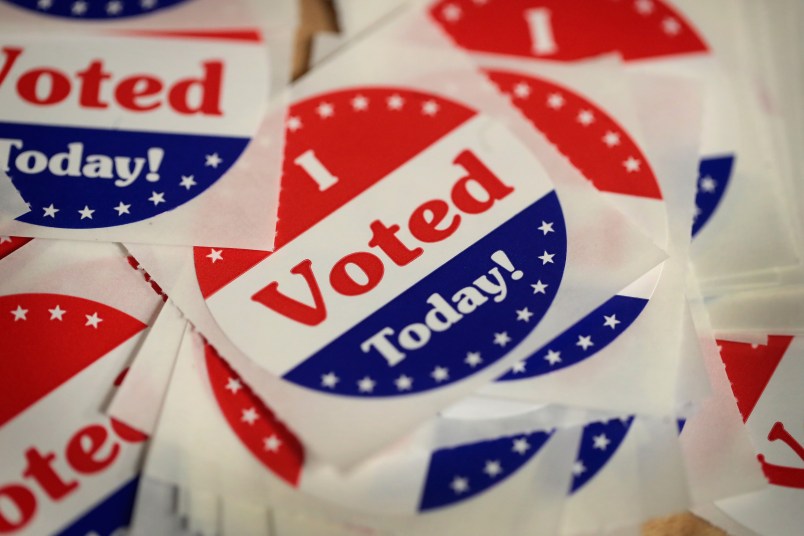ATLANTA (AP) — Federal and state officials have been working for nearly two years to shore up the nation’s election infrastructure from cyberattacks by Russians or others seeking to disrupt the voting process.
It turns out that many of the problems are closer to home.
Early voting leading up to Tuesday’s midterm election revealed a wide variety of concerns with voting and registration systems around the country — from machines that changed voter selections to registration forms tossed out because of clerical errors.
Election officials and voting rights groups fear that voter confidence in the results could be undermined if such problems become even more widespread on Election Day, as millions of Americans head to the polls to decide pivotal races for Congress and governor.
Already there is concern that last-minute court rulings on voter ID requirements, the handling of absentee ballots and other issues in a handful of states will sow confusion among voters and poll workers.
“We expect poll workers will be overwhelmed, just as voters are overwhelmed, and there will be lots of provisional ballots,” said Sara Henderson, head of Common Cause in Georgia, where voting-rights groups have been raising numerous concerns about election security and voter access.
The problems come amid a surge of interest, with registrations and early-voting turnout running well ahead of what is typically seen during a midterm election.
The election marks the first nationwide voting since Russia targeted state election systems in the 2016 presidential race. Federal, state and local officials have been working to make the nation’s myriad election systems more secure. They have beefed up their cybersecurity protections and improved communications and intelligence-sharing.
The U.S. Department of Homeland Security, FBI and other federal agencies have opened a command center to help state and local election offices with any major problems that arise.
“We want them to be as informed as possible,” said Matt Masterson, senior cybersecurity adviser with the Department of Homeland Security.
There have been no signs so far that Russia or any other foreign actor has tried to launch cyberattacks against voting systems in any state, according to federal authorities.
But early voting and voter registration has been problematic in a number of states. Problems include faulty machines in Texas and North Carolina, inaccurate mailers in Missouri and Montana, and voter registration problems in Tennessee and Georgia.
In other states, including Kansas, Election Day polling places have been closed or consolidated, leading to worries that voters will be disenfranchised if they can’t find a way to get there and cast a ballot.
Questions about election integrity erupted in recent days in Georgia, where the governor’s race is among the most closely watched elections in the country.
Over the weekend, reports of security vulnerabilities within the state’s online voter registration portal prompted a flurry of accusations from the Secretary of State’s office, which is overseen by Republican gubernatorial candidate Brian Kemp. His office claimed without providing evidence that Democrats had tried to hack into the system.
Democrats dismissed that as an effort to distract voters from a problem in a system Kemp oversees.
DHS officials have boasted that the 2018 midterms will be the most secure election in U.S. history, pointing to federal intrusion-detection sensors that will protect “90 percent of election infrastructure,” as DHS Undersecretary Christopher Krebs tweeted in mid-October. Those sensors sniff for malicious traffic, and are installed on election systems in 45 states.
But similar sensors used at the federal level have performed quite badly. According to a Sept. 14 letter from the Office of Management and Budget, those sensors had a 99 percent failure rate from April 2017 onward, when they detected only 379 out of almost 40,000 “incidents” across federal civilian networks.
Nationally, some 6,500 poll watchers are being deployed by a coalition of civil rights and voting advocacy groups to assist people who encounter problems at the polls. That is more than double the number sent to polling places in 2016, while the number of federal election monitors has declined.







Here is the story of how one woman exposed Kobach’s Crosscheck system for being unsecured in transmitting voter’s data. And to top it off she started by wondering why/how the State of Kansas had the money to foot the bill for hosting Crosstrack when the state of Kansas’ budget was hard pressed to fund their schools.
oh it’s going to get much worse for the 2020 election if he happens to be still alive.
BEIJING (Reuters) - China last month granted initial approval for 16 new trademarks for the fashion brand of U.S. President Donald Trump’s daughter and adviser Ivanka, including voting machines, a search of official records on Tuesday showed.
maybe Ivanka herself thinks, if I were president I could be just like daddy.